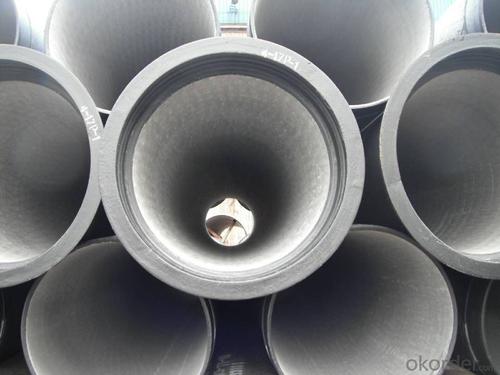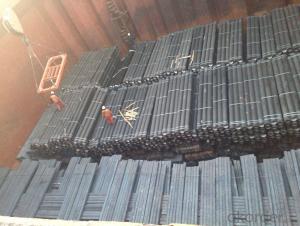DUCTILE IRON PIPE DN150 k9
- Loading Port:
- China Main Port
- Payment Terms:
- TT OR LC
- Min Order Qty:
- -
- Supply Capability:
- -
OKorder Service Pledge
OKorder Financial Service
You Might Also Like
Specification:
1) The standard of pipe: ISO2531:1998, K9
2) Effective length: 6m
3) Inner cement line: Portland cement line as per ISO4179
4) Zinc coating: at least 130g/m2 as per ISO8179
5) Bitumen painting: at least 70um as per ISO8179
6) With 100% quantity of NBR ring, or SBR ring, or EPDM ring as per ISO4633
7) DN80mm-800mm
8) High strength, lighter than grey iron, good corrosion resistance, no furring, small flow resistance, easy fixing, long life tome about 100 yeas
9) Produced by Hangzhou chunfeng machine
10) Checked by automatic inspection equipment
11) Composition:
Chemical composition | |||
Chemical composition | Ductile Cast Iron Pipe (%) | Grey iron pipe (%) | Steel pipe (%) |
C | 3.5-4.0 | 3.2-3.8 | 0.1-0.2 |
Si | 1.9-2.6 | 1.4-2.2 | 0.15-0.4 |
Mn | 0.15-0.45 | 0.4-0.6 | 0.3-0.6 |
P | ≤0.06 | ≤0.3 | 0.02-0.03 |
S | ≤0.02 | ≤0.1 | 0.02-0.03 |
Mg | 0.03-0.06 |
|
|
12) Feature:
Mechanical properties | |||
| Ductile Cast Iron Pipe | Grey Iron Pipe | Steel Pipe |
Tensile Strength(Mpa) | ≥420 | 150-260 | ≥400 |
Yield Strength(Mpa) | ≥300 | No Confirmation | No Confirmation |
Bending Strength(Mpa) | ≥590 | 200-360 | ≥400 |
Elongation (%) | ≥10 | Neglected | ≥18 |
Brinell Hardness(HBS) | ≤230 | ≤230 | About 140 |
13) T type mechanical joint
14) Packing: in bulk or container
- Q: What are the differences between ductile cast iron pipes and centrifugal ductile iron pipes?
- Centrifugal casting is a casting method. Ball milling cast iron pipe is a kind of material.
- Q: Can ductile iron pipes be used for bridge piers?
- Yes, ductile iron pipes can be used for bridge piers. Ductile iron pipes are known for their high strength and durability, making them suitable for various applications, including bridge construction. They have excellent resistance to corrosion and can withstand heavy loads, making them a reliable choice for supporting bridge piers. Additionally, ductile iron pipes offer ease of installation and maintenance, which can be advantageous in bridge construction projects. However, it is important to consider the specific requirements and design specifications of the bridge before selecting ductile iron pipes as the material for bridge piers. Proper engineering evaluation and consideration of factors such as load capacity, soil conditions, and environmental factors are essential to ensure the suitability and safety of using ductile iron pipes for bridge piers.
- Q: Steel plastic pipe, ductile iron pipe, steel pipe difference
- Spheroidal graphite tube, now application has been relatively small, generally used for conveying water, gas at room temperature, low pressure, large diameter pipelines need to produce concrete pipe base, good corrosion resistance than steel pipe joints, vulnerable to external extrusion and leakage, the price is relatively cheap.
- Q: Can ductile iron pipes be used in areas with high soil salinity?
- Yes, ductile iron pipes can be used in areas with high soil salinity. Ductile iron pipes are known for their high corrosion resistance, making them suitable for various soil conditions, including those with high salinity levels. The pipes are typically coated with a protective layer, such as polyethylene or zinc, which further enhances their resistance to corrosion from saltwater or saline soils. Additionally, proper installation techniques, such as proper backfilling and compacting of the soil around the pipes, can help minimize the potential impact of high soil salinity on the performance and longevity of ductile iron pipes.
- Q: What effect does magnesium play in nodular cast iron?
- The role of magnesium as spheroidizing agent used in iron spheroidizing treatment, promote water ink is made of iron, carbon in liquid iron spherical graphite precipitation.
- Q: Are ductile iron pipes suitable for bridge piers or abutments?
- Yes, ductile iron pipes are suitable for bridge piers or abutments. Ductile iron is known for its high strength and durability, making it a reliable choice for supporting heavy loads in bridge construction. Additionally, ductile iron pipes are corrosion-resistant, which is crucial for structures exposed to moisture and environmental factors.
- Q: What are the typical maintenance requirements for ductile iron pipe?
- The typical maintenance requirements for ductile iron pipe include regular inspections for signs of corrosion or damage, cleaning and flushing to remove sediment and debris, and occasional repair or replacement of sections that are worn or leaking. Additionally, applying protective coatings or linings can help prolong the lifespan of the pipe and prevent corrosion.
- Q: Are ductile iron pipes resistant to biological growth?
- Yes, ductile iron pipes are generally resistant to biological growth. Ductile iron is a strong and durable material that is commonly used in water and sewage systems. Its smooth surface inhibits the growth of bacteria, fungi, and other microorganisms that can contribute to biological growth. Additionally, ductile iron pipes are often coated with protective linings or coatings, such as cement mortar or epoxy, which further enhance their resistance to biological growth. However, it is important to note that no material is completely immune to biological growth, and regular maintenance and cleaning of the pipes may still be required to ensure long-term resistance.
- Q: Can ductile iron pipe be used for hydroelectric power generation?
- Yes, ductile iron pipe can be used for hydroelectric power generation. Ductile iron pipes are known for their strength, durability, and resistance to corrosion, making them suitable for various applications including the transportation of water in hydroelectric power plants.
- Q: How do ductile iron pipes perform in high-pressure applications?
- Ductile iron pipes perform exceptionally well in high-pressure applications. Due to their superior strength and durability, they can withstand the high-pressure conditions without any significant issues. The ductile iron material is known for its ability to handle high-pressure situations, ensuring the reliability and long-lasting performance of the pipes.
Send your message to us
DUCTILE IRON PIPE DN150 k9
- Loading Port:
- China Main Port
- Payment Terms:
- TT OR LC
- Min Order Qty:
- -
- Supply Capability:
- -
OKorder Service Pledge
OKorder Financial Service
Similar products
Hot products
Hot Searches
Related keywords


























